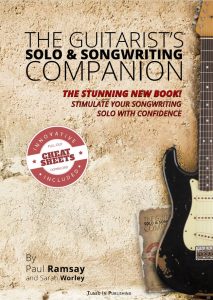All guitarists love the thought of playing their guitars, this drives me constantly, but is it always what you’d hoped it would be once you’ve put it down again – after playing the pentatonic scale patterns again, for the millionth time?!
All musicians want to improve, the steepness of our learning curves may vary but the trajectory is always UP! The good news is that yes, practice really does work! If you are struggling with a guitar lick and you play it every day for a week, it will be better in a week’s time.
Easy.
But we’ll always find excuses as to why we can’t do this, let me guess, … “didn’t have time”?
Making the precious little time that we have to practice our instrument count and be fun is the Holy Grail, because honestly for most of us it’s just a hobby, so if playing it is not fun and relaxing then that six-string will soon start gathering dust in the corner and we’ll never get any better.
I have found that INSPIRATION is the biggest factor in getting my butt into the practice room. This comes in many different forms for all of us. For me, going to see a live band is the biggest inspiration and whether they were amazing or they sucked I can guarantee that I will be playing my guitar the following evening, and I always play better than I did the last time and usually come up with a new riff or song. I also listen to music every day, from various genres, and I always find new inspiration from a song or two. There may a riff, solo, chord change or chord construction that inspires me or it may be nothing specific, I just know that I want to go play.
Learning a riff, chorus or solo to a song that you like is great worthwhile practice and something that I regret not doing more often when I was young and learning how to play guitar. I wasn’t interested in doing cover versions or learning easy guitar songs so I didn’t bother, but I see now that this is the best way to improve quickly and find your style. By learning your favourite songs you will not only feel great as you begin to nail them and can play them to your friends (who will be a LOT more interested in songs that they recognise!) but you will subconsciously plagiarise and mix-n-match your favourite bits from these songs in your own tunes and hence develop your own style. Playing along to a record also helps your timing, phrasing and to learn common/successful song structures and chord progressions. You will pick up useful guitar music theory by osmosis.
(Using the methods and cheat sheet in The Guitarist’s Solo & Songwriting Companion will also help you to break down your favourite songs into keys, chord progressions and modes, learn from this and add your own variations).

Buying a new guitar-related toy will ALWAYS inspire more playing time, which is great, and who doesn’t enjoy spending their hard-earned money on their hobby? (Hands up who doesn’t have at least twice as many effects pedals than they really need!) Playing around with a new sound is great for creativity which in itself is great practice, but remember …you can’t polish a turd! You DO need to find your sound but that comes more from your fingers than your gear! I went to a guitar clinic where Paul Gilbert was challenged by a lad that he would NEVER sound any good playing a stock Ibanez guitar through a crappy amp, so PG picked it up and shredded. Sounding exactly like Paul Gilbert.
Inspiration should also come from ambition, and dare I say ‘dreams’, no matter how old you are. This comes from inside, and I can’t speak for you but even as I’ve got older I still have a huge desire to impress my peers, myself, my friends … and strangers! Whether this comes from a recording or a great night on stage it’s a great feeling when your music creates enjoyment or you get even a little bit of recognition, and it makes all the ‘practice’ worthwhile.
- So you’ve been inspired to pick up your guitar and practice, how do you make sure that you’ll be better after you’ve put it down again?
- Warm up. Play clean, slow and error free.
- Concentrate specifically on your picking hand and also building fretboard-hand strength with legato licks.
- Get comfortable by playing something that you can nail: favourite licks/riffs/songs.
- Now try something that you can’t play well, this is how you improve. Try to figure out why you can’t play it well and work on that aspect of it. In my case, this is usually the picking. Slow it down, work out how you should try to play it and then slowly speed it up. Focus on the hardest part of the riff, not the easiest part!
- Repetition. It works. Even if you can’t notice an obvious improvement today, you will tomorrow.
- Put a drum machine on to a beat suitable for your mood for that day, choose a key and create a chord progression. Very simple if you use The Guitarist’s Solo & Songwriting Companion.
- Pick a mode and create a melody for that chord progression. (Again, use a cheat sheet from the book!).
- Record it, write it down and then listen back to it tomorrow to see if it was any good!
- Congratulations! You are now better than you were yesterday.
That could all be done in half an hour if you ignore distractions, and I’m willing to bet you’ll feel great afterwards!
Better than the thought of playing your guitar is when you put your head on your pillow at night knowing that you could outplay the you from yesterday!
